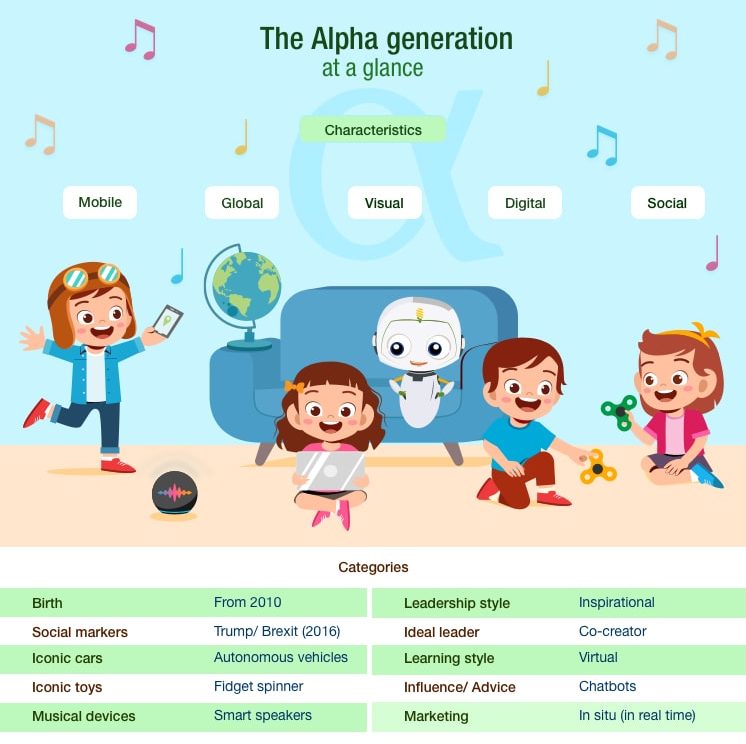In a world that’s evolving faster than ever, it’s not just the current trends you need to follow—it’s the future ones. While millennials have been the focal point of workforce and consumer strategies for years, the next generations—Gen Z and Generation Alpha—are rapidly shaping the way businesses operate. These tech-savvy generations are digital natives, born into a world where technology is as common as air. The real question is: Are businesses ready for them? Understanding how these generations think, work, and consume will be key to staying ahead of the curve. Let’s explore what makes them tick and how you can prepare for the future.
What are the Generations After Gen Y?
Millennials, individuals born between 1981-1994 are the hot topic in the corporate world. But focusing on only one generational cohort has several downsides.
With Boomers inching closer to retirement and older Gen Zs entering the corporate world, it is time to look beyond the millennial years. Let us dive deep into Generation X, Z, and Y along with their associated generation years.
What is Generation Z?
Gen Z are considered digital natives. People who belong to this 2010 generation were born at the turn of the century. The Gen Z years are 1997–2015.
If you roughly calculate the Generation Z age range, they are around 9 to 25 years old. Now that you know generation Z years, let us move on to the characteristics of Gen Z to best interpret their attitude toward work and personal life.
Tech-native
The generation possesses the ultimate language of tech; they speak tech fluently. Whether a digital platform, technology, or application, they know it and can use it. They were born into a world of technology and are alien to one without it. Gadgets, the internet, and social media comprise the world they know.
Further, technology is tightly integrated into their lives more than any other generation before it.
Job Security
Economic crises from the year 2008 have severely impacted the generation. It is the root cause Gen Z seeks job security more than others. They love experimenting based on their personal choices, but in the end, they look for employment that provides them with social and financial security.
Social and Global Awareness
They are the generation that grew up understanding that diversity and inclusion aren’t just buzz words. They are the lives of real people with who they’ve grown up. This generation is set to be much more tolerant and understanding than the ones before them.
Self Awareness
Though this generation is more tech-savvy than others, they have their insecurities. Baby Boomers and Millennials have far better people skills than Gen Z However, they are well aware of their deficiencies and cognitive gaps.
What is Generation Alpha?
Generation Alpha are the new kids on the block and are also known as the iGeneration. They are the new generation and the answer to your question, what’s after Gen Z? The Generation Alpha years are between 2011 and 2025. The prominent Generation Alpha characteristics include that this generation is likely to be the wealthiest, most highly educated, and technologically literate in history.
Let us check out other Generation Alpha traits.
Everything is About Technology
If we compare Generation Alpha vs. Gen Z, the latter speaks technology, but Generation Alpha is immersed in it. Their digital footprint is the key facilitator for Generation Alpha.
For instance, let us think of when Millennials created Instagram accounts. They probably had Instagram in their early 20s. But the oldest members of Generation Alpha, who are about nine years old today, already have a social media presence! Even newborn Alphas have Instagram accounts managed by their parents.
Different Learning Ability
Technology has changed the face of education and will continue to do so in the coming years. The current auditory and structured teaching practices will diminish, and visual and interactive education will take off.
Generation Alpha will have a completely revamped learning experience.

Enhanced Online User Experience
Perhaps it is due to being exposed to digital mediums from birth, but Generation Alpha only knows exceptional user experience. For them, digital platforms are all about personalized online experiences, seamless interface, cutting-edge ways of interaction, and other aspects.
It is one of the defining Generation Alpha characteristics.
Impatient and Independent
Technology fulfills almost all their desires, and hence, Generation Alpha is a lot more impatient. Generation Alpha will have their personal preferences and strongly voice their opinions. They expect each of their needs to be met, and companies need to account for this Generation Alpha characteristic.
Why Should Organizations Take Note of Generation Alpha?
The generations after millennials, Gen Z and Gen Alpha, are not in the workforce yet, but they affect the consumer market. If we closely study how they lead the impact in the market, we will be able to predict future possibilities. The present behavior of the generation after millennials will help us mold our business to best suit the present and future needs.
Let us start with the major areas in which Generation Alpha has an impact.
Technology
The generation after millennials has already changed the way of purchasing. Gen Z has brought about the age of short bite-sized videos through Tik-Tok. Generation Alpha will have the same zeal for video content but in more personalized mediums. They will expect quick, efficient, and streamlined deliveries of everything- content and purchases.
Environmental Impact
There is a common question that we expect from Millennials and the generations to come: How do brands contribute to the environmental impact, and what is their take on it?
They are global questions, and when businesses provide the answers to them, they have a good chance of gaining popularity and respect. Brands providing employment, products, or services need to collectively disclose what they offer to society’s well-being.
We see it taking root already, and the aspiration of people to associate with a brand that contributes to society will only grow.
Interaction and its Effect on Branding
The market is more diverse than ever, and we see the kind of services and creativity that make us want more. Generation Alpha will have a hard time being loyal to one brand. Generation Alpha will live with shorter brand affiliations. They’ll always look for the next best thing.
So, businesses that want to stay relevant need to ensure their creativity is at par with the Generation Alpha characteristics or above it. Brands need to keep in mind what their customers want over time and strategize accordingly. In this way, they will meet customer expectations and attain stability in growth.
Preparing for Generation Alpha
We have an overview of the Generation Alpha characteristics already. Just like we know the consumer behaviors of Generation Alpha, we have curated how to prepare for them.
Technology
An excellent user experience will be Generation Alpha’s priority. They will never compromise on this front since they have grown up with the best of the internet.
This seems fair enough if they expect an experience like no other.
Hence, companies must inculcate innovation and technological capabilities to their maximum extent. In HR this would mean that hiring processes need to be improved. The Generation is unlikely to take kindly to clunky personality tests and 4 rounds of technical interviews.
Impact and Purpose
If brands cater to the present generation’s need for a quality experience, but not social impact, they need to think again. Generation Alpha is concerned with how brands mold their narratives and make a tangible impact.
Companies need to come up with a different operating purpose and motto. They also need to ensure it is culturally inclined and adds value to society.
Brand and Employee Value Proposition (EVP)
Short brand affiliations of Generation Alpha apply to the brands and employers. Generation Alpha will want increased ownership in work. They will be proactive in their job role, understanding their responsibility toward achieving overarching company goals and looking for rewards and brands that offer value. Hence, companies need to provide shared ownership and value as well.
Since they value job security, they could be enticed with more long-term employee benefits like pension plans and even paid time off based on tenure.
What are the Generation Alpha and Gen Z Age Ranges?
The Gen Alpha age range will are individuals born between 2011 and 2025. In the new generation, the oldest members are nine years of age.
Gen Z refers to people born in the years from 1997 to 2012, where Gen Z are somewhere between 9 to 25 years in 2021.

How Do We Integrate Core Principles of Business to Match Generation Alpha?
We already have insights into how Generation Alpha will influence the market. It is better to integrate them into the business to ensure the business remains running and financially viable in the long term. Generation Alpha will want the best user experience, something to contribute to society, and a well-positioned employer brand.
Also, Generation Alpha will expect diversity and inclusion at the core of every hiring decision.
The Future of Technology with Gen Alpha
Tech advancement will continue to be the thing of the future. Artificial intelligence (AI) will be the face of future business norms. Here are some of the technical advancements that Generation Alpha will probably witness before others.
Mobile Phones
We are in a world where smartphones overshadow the need for multiple other objects. The Generation Alpha children have their lives centered around gadgets. Whether smartphones or tablets, younger children already own one of the two. Tablets and phones will stay in the future and play a great part in Generation Alpha’s life.
Virtual Assistants
Data processing algorithms will have an influential role to play in the future. Virtual assistants will help streamline the future user experience, the factors Generation Alpha values the most.
These automated systems will make the process of providing personalized, new interfaces seamless. They may also offer new forms of communication, and the present voice-based communication will become prevalent. We already live in a world where Alexa, Siri, or Google Assistant have become widely popular. The algorithms learn from user experiences and search history.
AI Powered Toys and Accessories
We do not mean toys in a literal sense, but gadgets integrated with AI. AI will be prevalent everywhere, in games, accessories, and entertainment. Accessories such as tech wearables and visually interactive games providing a real-life gaming experience will be in demand. Smartwatches and smart bands will be among the popular wearable gadgets, with new inventions hitting the market constantly.
Autonomous Vehicles
The driving experience will comprise tech-enabled vehicles. The common vision is that Generation Alpha will need autonomous vehicles to reduce traffic fatalities. The automotive industry will include countless vehicles that are tech integrated. Generation Alpha will seek programmed driving experiences that let them integrate technology with their vehicles through devices.
Areas of Concern for Generation Alpha
- The generation will likely lack concentration and the ability to pay close attention since technology can be a massive distraction.
- Social events for this generation will be online, and there will be less in-person socializing. They might be less sociable as a generation.
- The constant reliance on technology may reduce their creativity, and their imagination will probably take a hit.
- Research proves that they will be better educated and more goal-oriented than the generations before them. But they may choose to have a single-minded focus on their goals and ignore the work-life balance that Millenials have fought hard for.
Are You Ready for Generation Alpha?
Brands want to thrive in the long term. It is when you see and cater for the generations to come, that your business strategy will be sustainable and successful. The catch is to understand buyer personas before they transform and the future is Generation Alpha.



